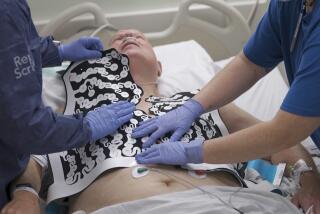Gene therapy with angioplasty may prevent bypass
- Share via
When it comes to restoring blood flow through blocked coronary arteries, angioplasty works well. But there may be a way to make it more effective.
New research has found that performing gene therapy at the same time can further improve the amount of oxygen-carrying blood nourishing the heart muscle.
Although gene therapy previously has been tried during open-heart surgery, the new study was the first to deliver gene therapy into the heart during minimally invasive angioplasties. The promising results suggest that patients with very serious coronary artery disease might be able to avoid risky bypass surgery.
At the same time that the researchers snaked a tiny balloon-tipped catheter into the arteries through a small incision in the groin to open up blockages, they also delivered copies of a gene for vascular endothelial growth factor (VEGF). VEGF enters heart cells and promotes the creation of new blood vessels.
The study involved 103 angioplasty patients, ages 38 to 75. In 37 patients, doctors delivered the growth factor using a disabled adenovirus that can get into cells and multiply without making the patient sick. They gave 28 the growth factor through fat cells called liposomes; 38 patients got a saltwater placebo.
Although blood flow improved for all three groups, those who got the growth factor through the adenovirus had significantly improved blood flow in the heart wall, said lead researcher Dr. Seppo Yla-Herttuala, a professor of molecular medicine at the University of Kuopio in Finland. He and his colleagues believe the growth factor caused the sprouting of tiny blood vessels called capillaries in the heart wall, increasing the blood supply.
The findings were reported in the May 14 online edition of Circulation: Journal of the American Heart Assn. In an accompanying editorial, a pioneering cardiovascular gene therapy research team at Tufts University School of Medicine, led by Dr. Douglas Losordo, called the results provocative. A major complication of angioplasty has been the formation of scar tissue in response to damage to the artery walls. Drug-coated stents have been one means of reducing the re-clogging.






